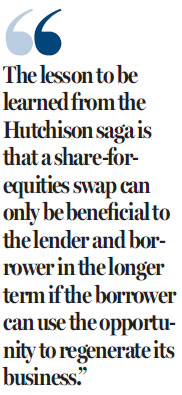Debt-equity swap plan needs careful thought
Updated: 2016-04-07 08:07
By Peter Liang(HK Edition)
|
|||||||
Hong Kong stock analysts are closely studying the possible impact of a reported proposal to shore up mainland banks' balance sheets by swapping doubtful debts for shares issued by financially troubled borrowers, mainly State-owned or government-controlled enterprises.

The proposed debt/equities swap program, first reported in a mainland business magazine last month, could have a far reaching impact on the earnings potential and financial structure of major mainland banks that are actively traded on the Hong Kong Stock Exchange.
While it's generally agreed that the plan would benefit both lenders and borrowers, it's doubtful if the scrips issued to the banks now would be worth much a few years down the road. Many of those issuers, after all, are chronic corporate patients who have been kept alive by constant dozes of new loans.
Unsurprisingly, at least one major investment bank in Hong Kong has cut its targeted prices of all the major mainland banks, citing "great challenges" facing the proposed debt-to-equities swap program. It predicted that the swap plan, if implemented, will give rise to "negative" sentiment in both the Hong Kong and mainland markets.
Supporters of the swap proposal have cited the turnaround of Hutchison International in the 1970s after it swapped its debt for a controlling stake in the company with HSBC, known then as Hongkong and Shanghai Banking Corp. But that's not the whole story.
The important part of that turnaround saga was the appointment of company doctor Bill Wyllie to lead Hutchison after it was made known to the bank that the existing management was incapable of returning the company to profitability despite the shedding of the debt burden. The bank later sold its stake to Cheung Kong's Li Ka-shing.
The lesson to be learned from the Hutchison saga is that a share-for-equities swap can only be beneficial to the lender and borrower in the longer term if the borrower can use the opportunity to regenerate its business. In some circumstances, as the Hutchison case shows, it's necessary for the creditor-turned-shareholder to initiate a management change in the company to achieve the desired result.
(HK Edition 04/07/2016 page9)